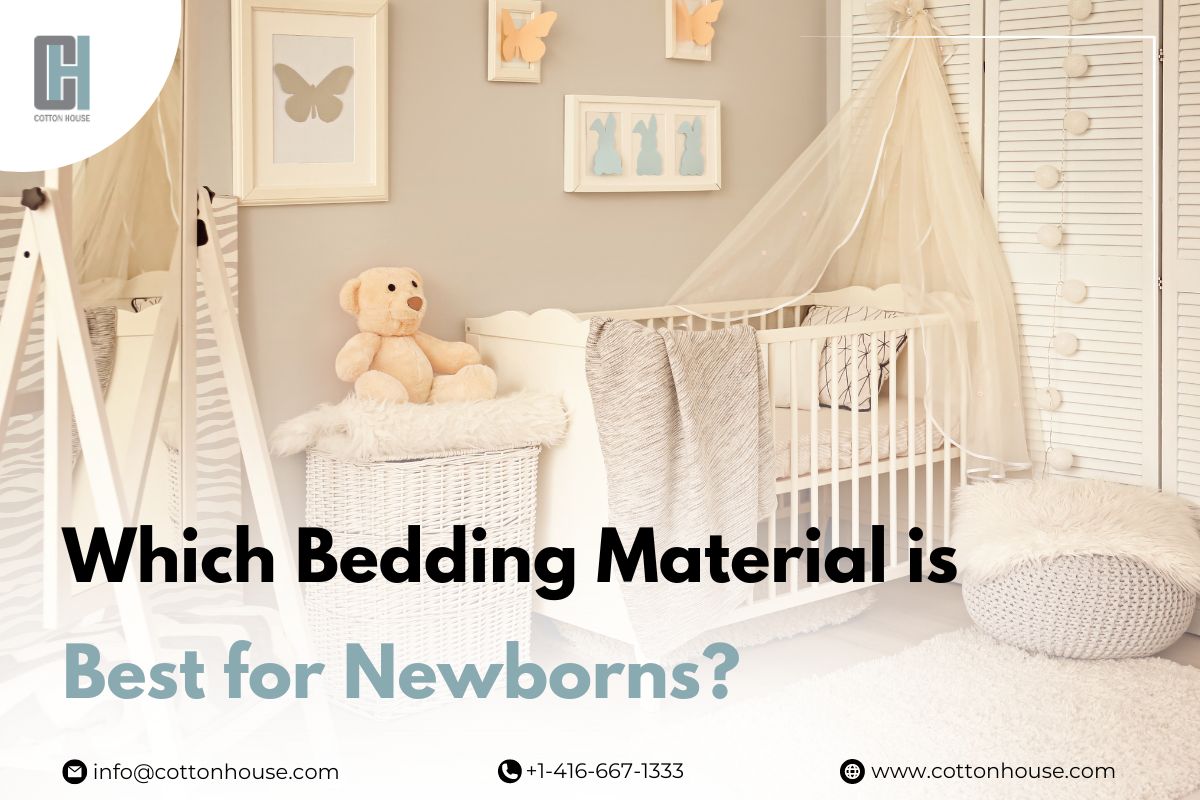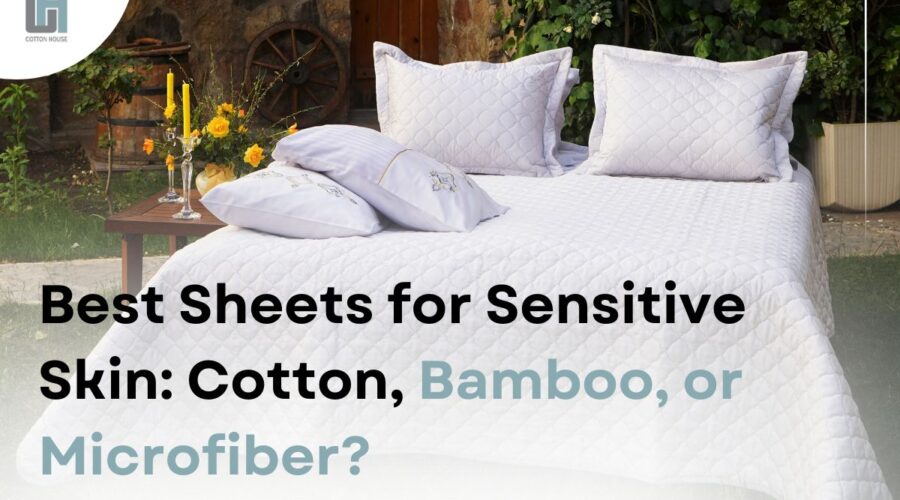
When it comes to preparing for a newborn, every detail counts, especially their sleeping environment. Parents often ask, “Which bedding material is best for newborns?” as they strive to create the most comfortable and safe space for their little ones.
This question is crucial because the material can significantly affect the baby’s sleep quality and skin health. In this blog, we’ll explore various bedding materials, focusing on finding the softest fabric for babies that ensures comfort throughout the night and is gentle on their delicate skin. Join us as we uncover the top choices for your precious bundle of joy.
Importance of Safe Bedding for Newborns:
Ensuring the safety of newborns as they sleep is paramount, not only for their comfort but for their overall health and development. The quest to find which bedding material is best for newborns should be guided by the principles of safety, softness, and suitability. The softest fabric for babies is not just about luxury; it’s a critical choice that can affect a baby’s ability to maintain a stable body temperature and enjoy uninterrupted sleep.
Moreover, baby-friendly bed sheet material should be free from small, loose threads and harmful chemicals, which can pose risks of breathing issues or allergic reactions. In choosing the right bedding, parents can safeguard their infants against common sleep-related risks while providing a nurturing environment that promotes healthful, restful sleep.

Types of Bedding Materials:
When determining which bedding material is best for newborns, it’s essential to consider several popular options, each with its unique benefits and considerations.
Cotton:
Cotton is widely acclaimed for being one of the softest fabrics for babies, offering breathability and gentle comfort against sensitive skin. Best crib sheets often feature high-quality cotton due to its durability and ease of washing. According to the National Sleep Foundation, cotton bed sheets help in maintaining a comfortable body temperature during sleep, making them a top choice for baby bedding.
Bamboo:
Bamboo is celebrated for its eco-friendly properties and natural softness, making it another contender for the best crib sheets. Its fibers are naturally hypoallergenic and possess antibacterial qualities that keep odors and allergens at bay—a crucial consideration for baby-friendly bed sheet material. A study by the Global Organic Textile Standard found that bamboo sheets can resist bacteria buildup by up to 99.8%, ensuring a cleaner sleep environment for infants.
Polyester:
While polyester is durable and resistant to wrinkles and shrinking, it is generally less breathable than natural fibers. However, advanced polyester blends are being designed to mimic the softness of more natural fabrics, offering a budget-friendly alternative for parents. Nonetheless, it’s less recommended for newborns due to the potential for overheating and less moisture absorption.
Organic Materials (Wool, Silk):
Organic materials like wool and silk provide excellent temperature regulation and natural hypoallergenic properties. Wool is particularly beneficial for maintaining warmth during colder months without overheating, making it a superb choice for crib bedding. Silk, while less common, is incredibly soft and gentle on the baby’s skin. According to a recent publication by the Organic Materials Review Institute, these natural fibers also reduce the exposure of harmful chemicals to babies, enhancing their overall sleep quality and safety.
Choosing the Right Bedding:
Selecting the right bedding for your newborn involves more than just picking a pattern or color that matches the nursery. It’s about prioritizing your baby’s comfort, safety, and health. Here are the key factors to consider to ensure you choose the best possible options for your little one.
Organic Crib Bed Sheets: Organic crib bed sheets are among the best crib sheets you can choose for your baby. Made without the use of harmful chemicals and pesticides, these sheets ensure that your baby is not exposed to any irritants that could harm their sensitive skin. The organic certification guarantees that the fabric has been produced under stringent environmental and social standards, making organic crib bed sheets a top choice for environmentally-conscious parents.
Baby-Friendly Bed Sheet Material: When shopping for the best crib sheets, it’s crucial to consider baby-friendly bed sheet material that is gentle on the skin and safe for all-night contact. Fabrics like organic cotton, bamboo, and silk are excellent choices as they are naturally hypoallergenic and soft. These materials are not just comfortable but also conducive to a good night’s sleep, which is essential for your baby’s development.
Softest Fabric for Babies: The softest fabric for babies is one that feels gentle to the touch and doesn’t irritate the skin. Fabrics like bamboo are known for their silky texture and moisture-wicking properties, making them some of the softest and most comfortable options available. Similarly, high-quality organic cotton is also revered for its softness and breathability, ensuring that your baby remains comfortable throughout the night.
Care and Maintenance of Newborn Bedding:
Here’s the care and maintenance information for newborn bedding organized into a table format:
| Maintenance Aspect | Guidance |
| Choose the Right Material | Opt for durable and easy-to-clean materials. Organic cotton and bamboo are ideal as they are both soft and withstand frequent washing. |
| Washing Frequency | Wash the bedding at least once a week, or more often if needed, to remove dirt and bacteria. Use baby-safe detergents. |
| Temperature Settings | Use warm water and a gentle cycle to prevent shrinking and roughness. Follow care label instructions closely. |
| Drying Tips | Air drying is recommended to maintain the shape and softness of the fabric. If using a dryer, opt for a low heat setting. |
| Storage Solutions | Store extra sheets in a cool, dry place away from direct sunlight to prevent fading and maintain fiber integrity. |
Conclusion:
Choosing which bedding material is best for newborns is a decision that influences not just sleep but overall health and well-being. By opting for the best crib sheets made from baby-friendly bed sheet materials, you ensure that your newborn is enveloped in comfort, safety, and cleanliness. The right bedding supports crucial sleep patterns and protects sensitive skin, helping your baby thrive in their early months. As you select your materials, remember that the choices you make will cradle your newborn into a better start in life.
FAQS
What is the safest bedding material for newborns prone to allergies?
Organic cotton and bamboo are the safest materials for newborns prone to allergies as they are naturally hypoallergenic and free from chemical irritants.
How often should I change or wash my newborn’s bedding?
It’s best to wash your newborn’s bedding at least once a week, or more frequently if there are spills, stains, or sickness.
Can bedding material affect my baby’s sleep quality and health?
Yes, the bedding material can significantly affect a baby’s sleep quality and health by influencing temperature regulation, comfort, and exposure to allergens.
What certifications should I look for when purchasing baby bedding?
Look for certifications like Global Organic Textile Standard (GOTS) or OEKO-TEX Standard 100, which ensure the bedding is free from harmful chemicals and safe for baby’s use.



